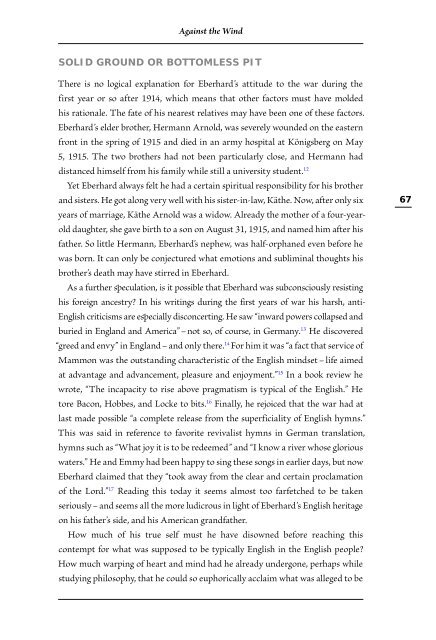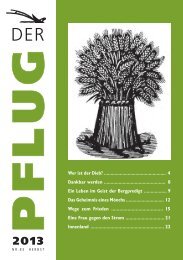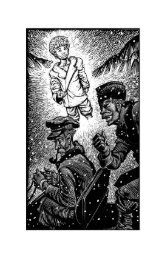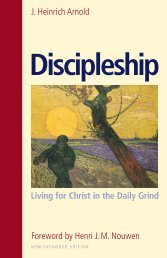Against the Wind: Eberhard Arnold and the Bruderhof - Plough
Against the Wind: Eberhard Arnold and the Bruderhof - Plough
Against the Wind: Eberhard Arnold and the Bruderhof - Plough
Create successful ePaper yourself
Turn your PDF publications into a flip-book with our unique Google optimized e-Paper software.
<strong>Against</strong> <strong>the</strong> <strong>Wind</strong><br />
Solid ground or bottomlESS pit<br />
There is no logical explanation for <strong>Eberhard</strong>’s attitude to <strong>the</strong> war during <strong>the</strong><br />
first year or so after 1914, which means that o<strong>the</strong>r factors must have molded<br />
his rationale. The fate of his nearest relatives may have been one of <strong>the</strong>se factors.<br />
<strong>Eberhard</strong>’s elder bro<strong>the</strong>r, Hermann <strong>Arnold</strong>, was severely wounded on <strong>the</strong> eastern<br />
front in <strong>the</strong> spring of 1915 <strong>and</strong> died in an army hospital at Königsberg on May<br />
5, 1915. The two bro<strong>the</strong>rs had not been particularly close, <strong>and</strong> Hermann had<br />
distanced himself from his family while still a university student. 12<br />
Yet <strong>Eberhard</strong> always felt he had a certain spiritual responsibility for his bro<strong>the</strong>r<br />
<strong>and</strong> sisters. He got along very well with his sister-in-law, Kä<strong>the</strong>. Now, after only six<br />
years of marriage, Kä<strong>the</strong> <strong>Arnold</strong> was a widow. Already <strong>the</strong> mo<strong>the</strong>r of a four-year<br />
old daughter, she gave birth to a son on August 31, 1915, <strong>and</strong> named him after his<br />
fa<strong>the</strong>r. So little Hermann, <strong>Eberhard</strong>’s nephew, was half-orphaned even before he<br />
was born. It can only be conjectured what emotions <strong>and</strong> subliminal thoughts his<br />
bro<strong>the</strong>r’s death may have stirred in <strong>Eberhard</strong>.<br />
As a fur<strong>the</strong>r seculation, is it possible that <strong>Eberhard</strong> was subconsciously resisting<br />
his foreign ancestry? In his writings during <strong>the</strong> first years of war his harsh, anti-<br />
English criticisms are esecially disconcerting. He saw “inward powers collapsed <strong>and</strong><br />
buried in Engl<strong>and</strong> <strong>and</strong> America” – not so, of course, in Germany. 13 He discovered<br />
“greed <strong>and</strong> envy” in Engl<strong>and</strong> – <strong>and</strong> only <strong>the</strong>re. 14 For him it was “a fact that service of<br />
Mammon was <strong>the</strong> outst<strong>and</strong>ing characeristic of <strong>the</strong> English mindset – life aimed<br />
at advantage <strong>and</strong> advancement, pleasure <strong>and</strong> enjoyment.” 15 In a book review he<br />
wrote, “The incapacity to rise above pragmatism is typical of <strong>the</strong> English.” He<br />
tore Bacon, Hobbes, <strong>and</strong> Locke to bits. 16 Finally, he rejoiced that <strong>the</strong> war had at<br />
last made possible “a complete release from <strong>the</strong> superficiality of English hymns.”<br />
This was said in reference to favorite revivalist hymns in German translation,<br />
hymns such as “What joy it is to be redeemed” <strong>and</strong> “I know a river whose glorious<br />
waters.” He <strong>and</strong> Emmy had been happy to sing <strong>the</strong>se songs in earlier days, but now<br />
<strong>Eberhard</strong> claimed that <strong>the</strong>y “took away from <strong>the</strong> clear <strong>and</strong> certain proclamation<br />
of <strong>the</strong> Lord.” 17 Reading this today it seems almost too farfetched to be taken<br />
seriously – <strong>and</strong> seems all <strong>the</strong> more ludicrous in light of <strong>Eberhard</strong>’s English heritage<br />
on his fa<strong>the</strong>r’s side, <strong>and</strong> his American gr<strong>and</strong>fa<strong>the</strong>r.<br />
How much of his true self must he have disowned before reaching this<br />
contempt for what was supposed to be typically English in <strong>the</strong> English people?<br />
How much warping of heart <strong>and</strong> mind had he already undergone, perhaps while<br />
studying philosophy, that he could so euphorically acclaim what was alleged to be<br />
67

















